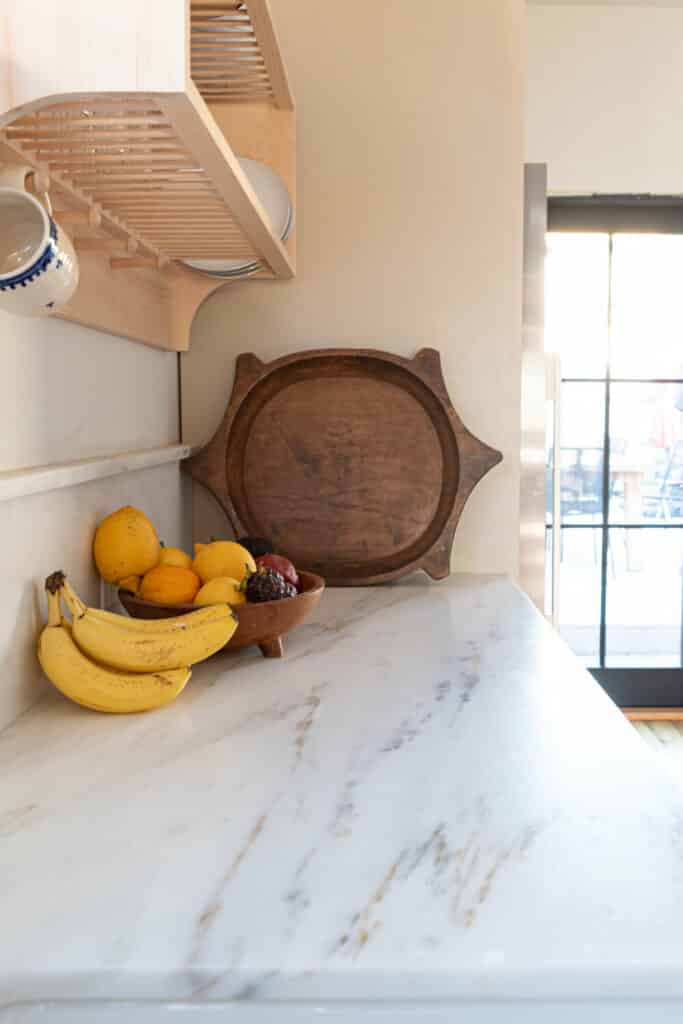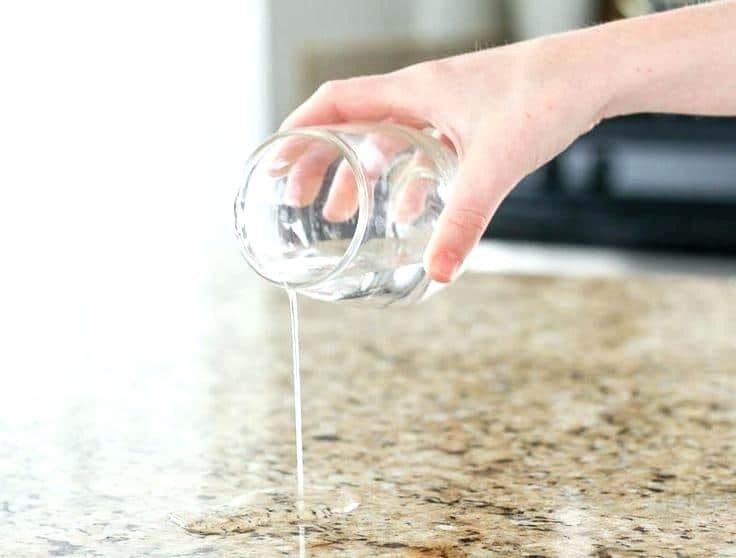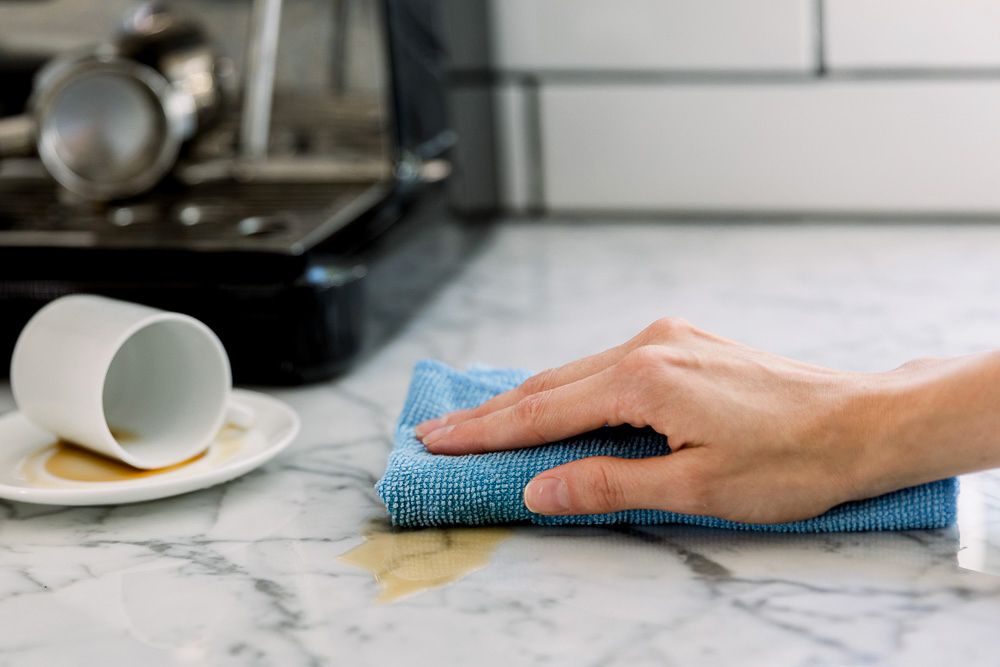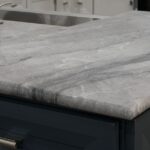Marble countertops add elegance and beauty to any kitchen or bathroom. However, as we already know, these natural stones are porous and can easily absorb liquids and stains if left unprotected oftentimes. That’s where a marble countertop sealer comes in – offering a simple safety measure to ensure the health of your natural stone for years to come.
In this article, we will explore the importance of using a marble countertop sealer, how to choose the best one, and a quick DIY tutorial to seal your marble countertops in case you’re willing to go that far without assistance.
The Importance of a Marble Countertop Sealer
Marble is a porous stone, which means it has tiny openings that can absorb liquids and stains. Without a proper sealer, everyday substances like wine, juice, and oil can penetrate its surface, leaving behind unsightly stains that are difficult to remove by conventional means.
Additionally, marble is susceptible to etching, which occurs when acidic substances, such as lemon juice or vinegar, react with the calcium carbonate in the stone, causing dull spots or marks. A high-quality marble countertop sealer acts as a protective barrier, preventing any kind of liquid from seeping into the stone, thus reducing the risk of both staining and etching in the long run.
By investing in a marble countertop sealer, owners of porous natural stones can ensure the longevity and beauty of their countertops.
Don’t miss: Marble Countertop Paint – Is It Worth It?
How to Choose the Best Marble Countertop Sealer

Investing in a high-quality marble countertop sealer is crucial – especially when we’re faced with so many options nowadays. When selecting a sealant, there are several important characteristics to consider, such as:
- Penetrating Power: Look for a sealer that has excellent penetrating power, allowing it to absorb deeply into the marble. This creates a strong protective barrier within the stone, preventing stains and etching from occurring on the surface.
- Breathability: Opt for a sealer that allows the marble to breathe. Breathability ensures that moisture vapor can escape from the stone while still providing a protective layer – and this prevents the formation of mold or mildew underneath the sealer.
- Longevity: Choose a sealer that offers long-lasting protection. Some sealers may need to be reapplied frequently, which can be time-consuming and costly. Look for a sealer with a reputation for durability and extended protection, for example.
- Oleophobic and Hydrophobic Properties: Consider a sealer that exhibits oleophobic and hydrophobic properties. Oleophobic sealers repel oil-based substances, making it easier to clean up spills and preventing staining. Hydrophobic sealers repel water-based liquids, reducing the risk of water stains on the marble surface.
- Food-Safe Products: If you plan to use the marble countertop for food preparation, a good tip is to choose a sealer that is labeled as food-safe, which are formulated to be non-toxic and safe for contact with food.
- Solvent-Based vs. Water-Based Sealers: There are two main types of marble sealers – solvent-based and water-based. Solvent-based sealers often provide a higher level of protection and have excellent penetrating capabilities. They are suitable for both indoor and outdoor use, while water-based sealers are more environmentally friendly and have lower levels of VOCs (volatile organic compounds). They are suitable for indoor use and may require more frequent reapplication, though.
By considering these characteristics, you can find the best marble countertop sealer that suits your needs and provides optimal protection for your countertops.
Popular Commercial Marble Countertop Sealers
Here are four examples of well-reviewed marble sealants available on the market:
StoneTech BulletProof Sealer
Known for its exceptional durability and long-lasting protection, this solvent-based sealer offers excellent stain resistance and helps repel oil-based liquids.
Miracle Sealants 511 Impregnator
This solvent-based sealer is widely praised for its deep-penetrating formula, providing superior protection against stains and moisture. Its versatility is suitable for various natural stone surfaces, including marble countertops.
Tenax Proseal Premium Stone Sealer
This water-based sealer is highly regarded for its ability to provide a natural-looking finish while offering exceptional stain resistance. It is formulated to be food-safe, making it an excellent choice for marble countertops used in food preparation areas.
Aqua Mix Sealer’s Choice Gold
This water-based sealer is a favorite among professionals and homeowners alike. It provides robust protection against stains and etching, and its easy application process is very suitable for DIY projects. It also offers a low VOC formula, ensuring a safer indoor environment.
Before making a final decision, be sure to read reviews, consider your specific needs, and consult with nearby professionals if necessary to determine the most suitable product for your requirements.
Can I Seal Marble Countertops Myself?

While there are many sealers available on the market, it is worth considering hiring a professional to seal your marble countertops. Although a DIY routine can be cost-effective, professional services offer several advantages, as you can see below:
- Expertise: Professionals have the knowledge and experience to select the right sealer for your specific marble type. They can assess the condition of your countertops and recommend the most suitable products and application techniques;
- Enhanced Results: Professionals have access to commercial-grade sealers and application equipment that may not be available to the general public. This can lead to a more thorough and effective sealing process, providing superior protection for your slabs;
- Time and Convenience: Sealing marble countertops can be a time-consuming task, especially for larger areas or multiple countertops. Hiring a professional allows you to save time and effort, as they will handle the entire process efficiently;
- Long-Term Benefits: Professional sealers often offer enhanced longevity, ensuring long-lasting protection for the marble stone. Additionally, professionals may provide extra warranties or maintenance plans, giving you peace of mind and added assurance.
How to Apply a Marble Countertop Sealer

That said, if you still decide to go for it without professional guidance, you need to make sure that you have the appropriate equipment for the task. Keep in mind that sealers can emit toxic fumes when wet – so you need to have a respirator, eye protection, and gloves, which you’ll wear during the entire process. By the way, make sure that the room where you’ll do the sealing is well-ventilated to help deal with the fumes.
You’ll also need brushes, sponges, towels, an applicator pad (to apply the sealer), a drill with a buffing attachment (to buff dry it later on), and painter’s tape (to protect things that may be nearby). The sealer you get may come with recommendations on the packaging for other stuff you may need, so follow the manufacturer’s instructions thoroughly.
Use the tutorial below to seal your marble slab:
- Prepare the Surface: Clean the marble countertop thoroughly to remove any dirt, debris, or stains. Use a mild, pH-neutral cleaner specifically formulated for marble. Then, rinse the countertop with water and ensure it is completely dry before proceeding.
- Test the Sealer: Before applying the sealer to the entire countertop, it’s advisable to perform a small test on a small, inconspicuous area of the marble. This allows you to ensure compatibility and observe the sealer’s effect on the marble surface.
- Apply Painter’s Tape (optional): If desired, apply painter’s tape to protect any surrounding surfaces or areas that you don’t want the sealer to come into contact with. This step is optional but can help in achieving clean edges.
- Apply the Sealer:
- Put on protective gloves to protect your hands during the application process.
- Pour a small amount of the marble countertop sealer onto a clean, lint-free cloth or applicator pad. Avoid using excessive amounts of the sealer, as it can lead to streaks or pooling on the surface.
- Begin applying the sealer to the marble countertop in smooth, even strokes, working in small sections at a time.
- Ensure that the sealer covers the entire surface evenly, including edges and corners. Take care not to leave any areas untreated.
- Allow the sealer to penetrate the marble surface for the recommended amount of time specified by the manufacturer. This time may vary depending on the sealer used.
- Wipe off Excess Sealer: After the recommended penetration time has passed, use a clean, lint-free cloth to gently wipe off any excess sealer from the countertop surface. This helps to prevent streaks or a sticky residue from forming. Pay attention to any areas where sealer might have pooled or dripped and wipe them off completely.
- Allow the Sealer to Cure: After applying the sealer and wiping off the excess, allow the countertop to cure as per the manufacturer’s instructions. This curing time allows the sealer to bond with the marble surface and provide optimal protection.
- Perform Regular Maintenance: Keep in mind that sealing is not a one-time solution. Depending on the sealer used, you may need to reapply it periodically as recommended by the manufacturer. Follow a regular cleaning routine using pH-neutral cleaners to maintain the appearance and longevity of your sealed marble countertops.
At the end of the day, while sealing your marble countertops yourself can be a viable option, considering the expertise and benefits offered by professionals is always a great idea to achieve the best possible results.
So Get A Team Who Can Seal Marble Counters for You!
If you’ve never sealed marble or any natural stone before, this process is going to be pretty difficult – even if it looks straightforward. A lot can go wrong, you see: you may end up scratching your product, using the wrong sealer, or making the surface uneven, all of which compromise the lifespan of your expensive home investment.
Therefore, to ensure everything goes well – and that your marble countertop comes out looking better than ever – get a professional sealing job, as we mentioned before. If you’re trying to seal marble counters for the first time, you’ll probably get it wrong and need someone to fix it, which will lead you to an expert anyway. A professional job ends up saving you money!
Here at Eagle Stones, we specialize in marble slabs from all over the globe, so we can help you out. If you live near Sarasota, Florida, get in touch – and we can send a specialist to help figure out the best way to seal your marble counter. Check out our services by clicking here.



